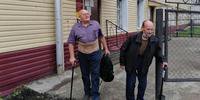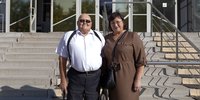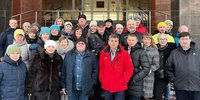The Case of Isakov and Minsafin in Kurgan
- #
Nikolay Astapov, an investigator for particularly important cases of the Investigative Committee of the Russian Federation for the Kurgan Region, initiates a criminal case under Part 1 of Article 282.2 of the Criminal Code against 56-year-old Anatoly Isakov, as well as under Part 2 of Article 282.2 of the Criminal Code of the Russian Federation against 49-year-old Valery Minsafin only because believers profess the religion of Jehovah's Witnesses, that is, they read and discuss the Bible with friends. The case is assigned No. 12102370012000107.
According to the investigation, Anatoly Isakov committed a criminal offense because he "carried out ... religious meetings... including through video conferencing using the Zoom platform."
- #
The Isakovs' apartment and country house, as well as their daughter's apartment, are being searched with the participation of officers of the Border Guard Service of the FSB of Russia in the Kurgan and Tyumen regions. Bibles in various translations, Bible reference books and dictionaries, books by Russian religious scholars, autobiographies of Jehovah's Witnesses who were prisoners of Nazi concentration camps, as well as letters, photographs, notebooks with personal notes, bank cards and documents are seized from the believer. In addition, the security forces take away the printer, electronic devices and storage media.
During the search, one of the security officials demands that the believer's wife, Tatyana, "tell us about everything," threatening her and her daughter with dismissal from their jobs.
The believer is a disabled person of group II: he is struggling with oncology, needs regular hospitalization (approximately every 2 months) and constant intake of potent prescription drugs. Despite his diagnoses, he is left in custody in a temporary detention facility, where he spends the night.
That same morning, they came to the house of the Minsafin family with a search. The first unexpected guests are noticed by their minor daughter. Opening the door, Valery sees 10 people. Investigator for especially important cases of the Investigative Directorate of the Investigative Committee for the Kurgan Region, Alexei Tretyakov, presents a court order to conduct a search.
The security forces consistently search every room, as well as the basement, bathhouse, summer kitchen, car and land. They seize electronic devices, bank cards, flash drives, a printer, Bibles in various translations, a Bible game, an encyclopedia, and personal records. A technician tries to unlock smartphones and tablets.
From stress, Valeriy's wife has high blood pressure. The security forces allow Valeriy to eat and pack his things, after which they take him to the Investigative Committee for interrogation. There he is provided with a lawyer.
The investigator for especially important cases of the Investigative Directorate of the Investigative Committee for the Kurgan Region, T. V. Kononova, detains and sends the believer to the temporary detention facility in Kurgan for 48 hours.
- #
Nikolay Astapov officially prosecutes Anatoliy Isakov as a defendant under Part 1 of Article 282.2 of the Criminal Code of the Russian Federation.
The judge of the Kurgan City Court A. N. Schneider chooses a measure of restraint for Anatoly Isakov in the form of imprisonment in a pre-trial detention center for 2 months. The court does not take into account the serious state of health of the accused.
In the pre-trial detention center, prisoners are obliged to follow the requirements of the pre-trial detention center, including physical activity, which Isakov cannot perform due to his health condition: he can hardly move, and it is beyond his power to walk in the ranks and keep the speed of movement.
- #
Investigator Nikolay Astapov decides to release Valery Minsafin from custody due to the lack of grounds for further restriction of his freedom.
- #
The lawyer files an appeal to the Kurgan Regional Court against the chosen preventive measure of Anatoly Isakov. According to the lawyer, the believer must be released from the pre-trial detention center.
- #
The believer's lawyer files an appeal with the Department of Health of the Kurgan Region against the chosen measure of restraint and asks for it to be canceled. The detention of a believer in a pre-trial detention center poses a threat to his life and health. In the complaint, the lawyer notes: "Such conditions cause systematic and daily pain, comparable to the torture and torture of a person in old age, since the pain intensifies and becomes unbearable at times, and the threat to life and health becomes real." The arrest interrupts the chemotherapy that the believer has been undergoing since July 5, 2021. The treatment was supposed to end on July 25, 2021. All this poses a threat to the life of Anatoly Isakov.
He also asks for the prosecution of the doctor who misled the court about Isakov's state of health, concluding that he could be detained.
- #
The defense re-submits a petition to the Kurgan Regional Court demanding that Isakov's preventive measure be changed or canceled without delay.
- #
Lawyers file a complaint with the ECHR about the detention of a believer despite his serious health condition.
- #
The ECHR sends a request to the Prosecutor General's Office of the Russian Federation. Lawyers also appeal to the Commissioner for Human Rights in the Kurgan Region, after which the Commissioner initiates an urgent inspection.
- #
The court releases Anatoly Isakov from the pre-trial detention center and, at the request of the investigator, chooses a measure of restraint for the believer in the form of a ban on certain actions.
- #
- #
Judge of the Kurgan City Court of the Kurgan Region Sergey Lushnikov issues a search warrant for 27-year-old Roman Kuchin. According to investigators, Roman is one of the "members of the congregation" and his home may contain items that are important for the criminal case against Anatoly Isakov.
- #
At 7:10 a.m., A. A. Kravchenko, senior investigator of the Kargapol Interdistrict Investigation Department of the Investigative Committee of the Investigative Committee, accompanied by two FSB officers, searches the place of registration of Roman Kuchin's wife. The security forces find her parents at home. Having received no information about the whereabouts of Roman and his wife, they inspect electronic devices, but do not seize anything.
- #
The case against Valery Minsafin was dismissed. The charges against him have been dropped.
- #
The case goes to the Kurgan City Court of the Kurgan Region. It will be considered by judge Sergey Lytkin.
- #
The court establishes the identity of Anatoliy Isakov and explains his rights. The prosecution briefly states the essence of the charge.
Anatoly Isakov and his lawyer express their attitude to the charges.
- #
The state prosecutor requests the disclosure of the protocols of the interrogation of prosecution witnesses who did not appear. The defense objects. The court rejects the prosecutor's request.
- #
5 prosecution witnesses are interrogated, after which, at the request of the prosecutor, the protocols of their interrogation are read out. Three women do not confirm their testimony. One of the witnesses states: "There are many things written that I did not say, much not from my words." Another witness claims that he does not know Isakov.
- #
The court is questioning three witnesses for the prosecution. They use Article 51 of the Constitution of the Russian Federation.
The prosecution files a motion to adjourn the hearing, to forcibly bring one of the prosecution witnesses and to re-summon witnesses who have not previously appeared in court. The judge grants the petition.
- #
Four prosecution witnesses are being questioned. One of them was one of Jehovah's Witnesses until 2016. He notes that their goal is "just to bring people together so that everyone lives in peace." At divine services, he did not hear statements inciting hatred and enmity from the defendants.
- #
Two prosecution witnesses are questioned, after which the court reads out the protocols of their interrogations. Both women do not corroborate their testimony because they do not remember what they said. One of them justifies this by the fact that she was in a state of shock.
- #
The prosecution files a motion to read out the testimony of two deceased witnesses, the defense objects. The court rejects the petition, but decides to attach it to the case file. The testimonies of witnesses are read out.
- #
The prosecution petitions for the interrogation of the secret witness Olenin without visual control. The defense objects, but the court grants the motion.
- #
The secret witness Olenin is interrogated. He says that believers used them to study the Bible, sing songs and pray. He also notes: "Rights, freedoms and legitimate interests were not violated during the meetings."
Olenin refuses to answer some questions, fearing that his identity may be revealed in this way.
- #
The prosecution presents its evidence and reads out documents from 10 volumes of case materials. The defense draws attention to the fact that the prosecution does not indicate exactly how these documents confirm Isakov's guilt.
- #
The defense presents evidence, reads excerpts from the case materials, which number 20 volumes, and examines the material evidence.
- #
The lawyer continues to present evidence of innocence and asks to attach a number of documents to the case file, including the opinions of the UN Working Group on Arbitrary Detention, ECHR rulings, as well as expert opinions on the presence of diseases that prevent Isakov from being held in custody.
The defendant testifies.
- #
The prosecutor requests for Anatoly Isakov 6.5 years probation with a probationary period of 3.5 years and deprivation of the right to engage in activities related to the dissemination of religion, religious education, holding religious services, religious ceremonies for a period of 9 years.
The defense filed a motion for the defendant to participate in the debate and adjourn the hearing to prepare Isakov for it. The court grants these requests.
- #
In his final statement, Anatoly Isakov says: "Your Honor, how can high-ranking people, for example, the president, members of the Council of Europe, representatives of the UN or you, learn about God? Only the situation with the persecution of believers will create such conditions. And now here I am – the president, the members of the Council of Europe, the United Nations, and even you have to listen to Jehovah's Witnesses and delve into their teachings."
The final statement of the defendant Anatoly Isakov in Kurgan - #
- #
Kurgan Regional Court (78 M. Gorky Street, Kurgan). Time: 9:00 a.m.



